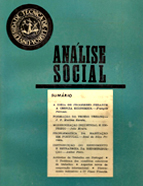

................................
In light of a broader view or a more comprehensive criterion regarding the historical significance of some research dedicated to macroeconomic and macrosociological issues, it will always be possible to allude to the inevitably historical nature of reflections on the processes and dynamics of economic growth and development, which have been of such interest to Análise Social . Indeed, in many essays devoted to the study of the structures and evolution of Portuguese society, we find passages or references in which historical antecedents are called upon to bear witness to or prove the changes or continuities that have taken place. Even in more abstract and theoretical essays, the history of ideas and science are called upon to aid in the understanding of current literature. The most striking example of this kind of implicit complicity between the social sciences and history was provided in the inaugural article of the journal dedicated to the study of ideologies (Vol. I, No. 1, 1963), signed by Adérito Sedas Nunes, which is clearly situated within a perspective of the history of ideas.
However, the indirect presence of history in this type of essay does not invalidate the overall assessment that must be made of the subordinate role that history as an academic discipline (still) occupies in the structure of the GIS as a research unit and in the results of its scientific output throughout the period under consideration (1963-1974). In the following decade, history would become quite different.
The April 1974 Revolution marked a turning point in the establishment of new research themes, which were particularly enriched by contributions to the study of the historical foundations of contemporary Portugal’s problems. The GIS, later transformed into the ICS, but always through the pages of Análise Social , witnessed a profound renewal of the historiographical field (social, political, economic, institutional, colonial and cultural history), which defined new horizons for research and left decisive marks on the advancement of historical knowledge in Portugal.
This work is financed by national funds through FCT - Foundation for Science and Technology, I.P, in the scope of the projects UIDB/04311/2020 and UIDP/04311/2020.
